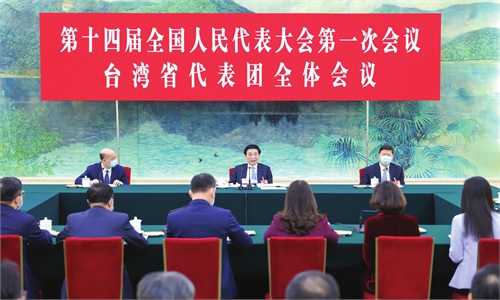
Illustration: Tang Tengfei/Global Times
Senior Chinese officials have met with business leaders from the Taiwan region in recent days, calling for strengthened cross-Straits cooperation and pledging to benefit Taiwan compatriots and enterprises. Even as the secessionist Democratic Progressive Party (DPP) authorities' collusion with US politicians stirred up escalating tensions in the Taiwan Straits, these meetings sent a renewed signal that the vast mainland market still welcomes Taiwan companies with open arms, should they choose not to be pawns in the US' containment against the Chinese mainland.Zhang Guangjun, vice minister of the Ministry of Science and Technology, on Thursday met with Cher Wang, chairperson of HTC Corp, and Chen Wenchi, president and CEO of VIA Technologies. Zhang stressed support for Taiwan companies and expressed hope for them to participate in national high-quality development and promote cross-Straits scientific and technological exchanges, the ministry said in a statement on Monday.
The mainland has long been continuously ramping up its support for Taiwan companies, implementing a range of specific facilitation measures, and constantly expanding the fields and scope of deepening cooperation, which allows enterprises in Taiwan to share the dividends brought by the rapid economic development of the mainland and its vast market, strengthening the resilience of Taiwan companies in the face of shocks such as the COVID-19 epidemic.
Since 2018, the Taiwan Affairs Office of the State Council, together with the National Development and Reform Commission, the Ministry of Agriculture and Rural Affairs and other relevant departments, have successively issued "31 Measures" and "26 Measures" to promote cross-Straits economic and cultural exchanges and cooperation, and "11 Measures" to support the development of Taiwan enterprises in response to the impact of the epidemic.
With the support of the series of policies, Taiwan companies have achieved remarkable development in a variety of fields in the mainland. According to data released by the Taiwan Affairs Office of the State Council in February, with the encouragement of taxation and other preferential policies, there are more than 1,400 high-tech Taiwan companies in South China's Guangdong Province and East China's Jiangsu Province. Among these, Taiwan companies investing more than $10 million in Guangdong enjoyed more than 4.7 billion yuan ($683 million) in tax reductions and exemptions last year.
In the financial sector, nearly 60 companies with investment from Taiwan island-based businesses are listed on Chinese mainland's A-share market, as the mainland supports the listing of eligible Taiwan-invested firms, and provides diversified and efficient financial services to their benefit. Last year, 10 such companies went public on the A-share market, setting a new record. The mainland has also facilitated the growth of Taiwan-funded firms with other financial services. East China's Fujian Province launched a pilot program of "financial credit certificates for Taiwan businessmen and Taiwan compatriots" in Pingtan in March 2019, and the program now covers the whole Fujian Province.
Behind the mainland's supportive policies is the sincere hope to truly support the development of enterprises from the Taiwan island and for the common prosperity of both sides of the Straits. Recent meetings with Taiwan business representatives once again reassured Taiwan businesses, which are willing to embrace the mainland market, that opportunities will remain open to them.
Looking forward, many more opportunities will emerge as the mainland's economy pivots toward high-quality development. For instance, Zhang said during the Thursday's meeting that the mainland regards artificial intelligence, high-end chips, blockchain, virtual reality and other technologies as key development directions during the 14th Five-Year Plan (2021-25), calling for HTC, VIA and other Taiwan-based technological firms to be integrated into the national high-quality development.
Nevertheless, the prerequisite for Taiwan companies to join the quality economic growth of the mainland in the future is that they will not act as proxies for belligerent US strategy toward the mainland. At present, the DPP authorities are colluding with the US, and even use Taiwan's high-tech industry as a bargaining chip to curry favor with Washington, seriously compromising the interests of Taiwan businesses.
Taiwan Semiconductor Manufacturing Co said Monday that its revenue fell 15 percent in March from a year earlier, marking the first drop in nearly four years. At a time when Taiwan island is worried about TSMC's transformation into "USSMC," the decline in TSMC's performance should sound the alarm for Taiwan's high-tech industry.
With the global economic gloom and waning external demands, Taiwan companies in high-tech and other related sectors, which rely heavily on exports, need to integrate more deeply into the Asia-Pacific industrial chain and firmly grasp the mainland market. The mainland can provide a broad space for the development of Taiwan enterprises, while the US will only sacrifice Taiwan companies' interests to serve its own geopolitical calculation.
The author is a reporter with the Global Times. bizopinion@globaltimes.com.cn



